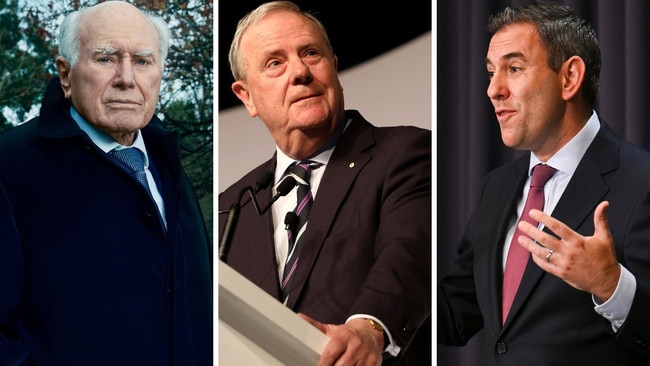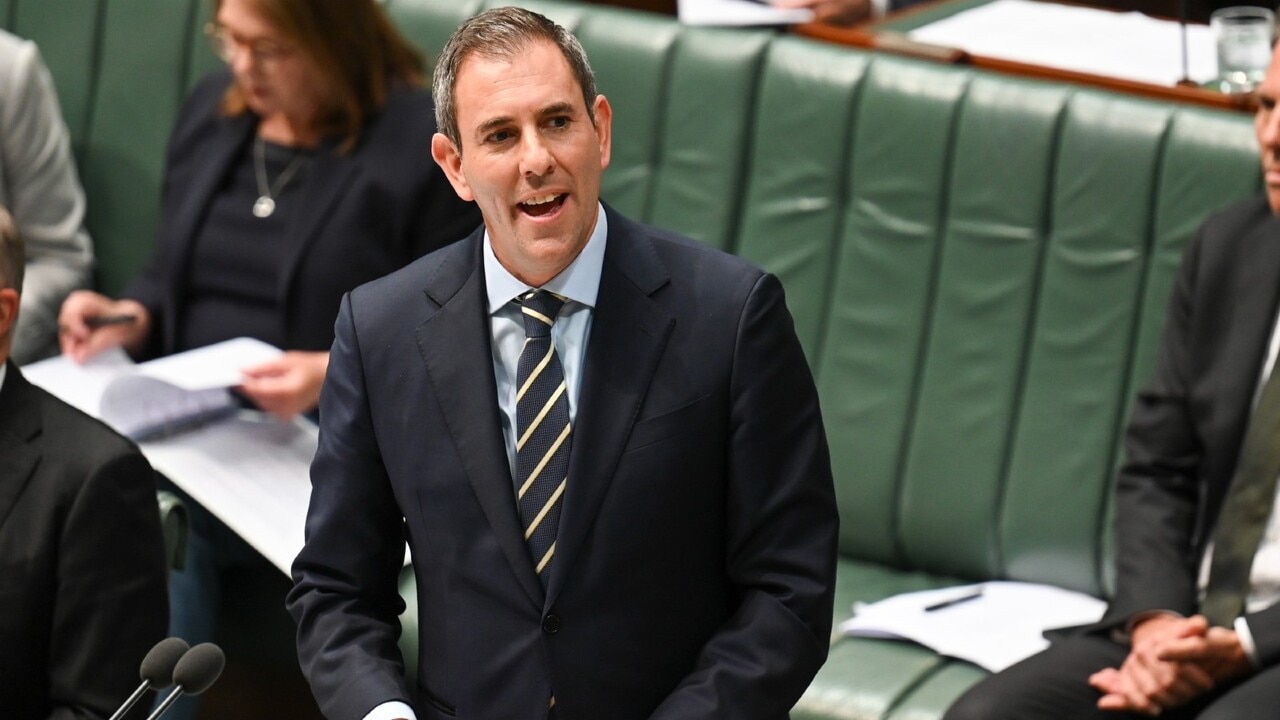‘Fiscal vandalism’: John Howard, Peter Costello slam Jim Chalmers’ changes to Future Fund
Jim Chalmers’ changes to the Future Fund have been denounced as ‘fiscal vandalism’ by John Howard, as he and fellow sovereign wealth fund architect Peter Costello lead a chorus of stinging attacks.

Jim Chalmers’ changes to the Future Fund have been denounced as “fiscal vandalism” by John Howard and creating “a political slush fund” by Peter Costello, with the architects of the sovereign wealth fund leading a chorus of stinging attacks against Labor’s new investment mandate.
Mr Costello, the chair of the Future Fund from 2014 until this year, also declared there was “no reason” Labor would not force the same mandate on the entire superannuation sector in the future.
Mr Howard said changing the rules for the $230bn fund – so it was required to consider investments in the government’s priority sectors – was “fiscal vandalism with a great dollop of hypocrisy”.
The former treasurer and former prime minister, who established the fund while in government in 2006, were joined by business groups, the Coalition and inaugural Future Fund chairman David Murray in condemning the overhaul and rejecting the Treasurer’s claim it would not have an impact on the fund’s healthy returns.
Dr Chalmers on Thursday argued that the requirement the fund consider new “national priorities” in its investment decisions was “not an especially controversial change” and “not unusual”, with the fund to remain a “primary focus” on returns.
The national priorities under the mandate will be: increasing the supply of residential housing; supporting the energy transition for the net-zero transformation; and delivering infrastructure projects that will improve domestic supply chains. “We haven’t seen major changes like this to the Future Fund since its inception,” Dr Chalmers said.
“There’s not many institutions that would expect to go for two or three or four decades without anybody having a view about how you could improve them.”
Dr Chalmers committed to keeping the fund’s capital locked up until 2032-33, an extension of six years, when it would then be used to fulfil its role in helping pay the pensions of retired public sector workers.
The Coalition is vowing to reverse Labor’s overhaul if it wins government, making the formerly bipartisan direction of the Future Fund a contentious political issue.
Mr Costello said Dr Chalmers was wrong to claim the new mandate would not impact the Future Fund’s average annual return requirement of between 4 and 5 per cent above the inflation rate.

“The only purpose of requiring the board to consider ‘national priorities’ is to get a whole lot of projects that wouldn’t come in under the sole 4-5 per cent return mandate into consideration,” Mr Costello said. “It will ultimately lower returns and that will cost taxpayers money.”
Mr Costello said the proposal to up-end the body’s investment mandate had never been raised with him by Labor.
“If they had, I would not have agreed to it,” he said.
He said he anticipated a “long line of rent-seekers to form a queue outside the Future Fund” in order to obtain investment. Mr Costello said other government funds investing in housing and green energy – such as the Clean Energy Finance Corporation – had not “done very well”. “This is a very bad proposal. I do not say this out of partisanship. I say this because the Future Fund was never set up to be a political slush fund to finance the whims of the government of the day,” Mr Costello said.
Recollecting the fund’s inception, Mr Costello said the Coalition had sought to build a bipartisan consensus to safeguard the fund’s independence and prevent government intervention. “That consensus has been broken and that independence seriously undermined,” he said. “The Future Fund is something that makes Australia different from, and better than, comparable countries – something Australia was able to do exceptionally well. Unfortunately, the age of Australian exceptionalism is coming to an end.”
Mr Howard said that when the Future Fund was being established the Labor Party repeatedly opposed the sale of Telstra, which provided a significant part of the initial $60bn seeding fund.
“Having tried to wreck the enterprise they now want a share of the proceeds,” he said.
The stoush over the Future Fund spilt into parliament’s question time on Thursday, with opposition Treasury spokesman Angus Taylor repeatedly interrogating the government over its plans, questioning whether the amended investment mandate would replace ordinary budget spending.
Dr Chalmers lambasted the opposition over its criticisms.
“If they want there to be less investment in housing, just confess,” he said. “It’s the same for clean energy and the same for infrastructure and economic resilience. I expected this usual, predictable and partisan hyperventilating from the usual, predictable and partisan places and that is what we have seen today.”
Mr Murray said the new mandate would increase the Future Fund’s risk profile and potentially have an impact on long-term returns. “This policy that has been announced today isn’t free from government influence,” he said. “It’s setting up specific purposes. The Future Fund originally never had specific purposes in its investments.”
Australian Industry Group chief executive Innes Willox described Labor’s changes as “deeply alarming” and warned that assurances against politicisation and optimal returns could no longer be guaranteed.
“It would now appear the fund will operate as an off-budget investment vehicle for the government,” he said. “Given its consequences, it would have been more astute for the government to seek a mandate for this decision at the next election.”
Concerns over the impact of Labor’s changes on the fund’s returns – which averaged 8.3 per cent per annum in the last decade – were shared by Australian Chamber of Commerce and Industry chief executive Andrew McKellar.
“The notion that fund managers directing investment into subset areas will enjoy the same returns as fund managers with the freedom to follow commercial merit is a logical flaw which will mean real-world losses for Australian taxpayers,” Mr McKellar said.
Former finance minister Nick Minchin, who worked with Mr Howard and Mr Costello in establishing the Future Fund in 2006, said it was “political nonsense” to claim returns would not be impacted. “The board is responsible to the minister and how else is the board going to read this statement?” he said. “They’re going to read this and say: “He wants us to invest in housing and the energy transition and infrastructure. Oh well, okay, away we go.”
The Greens welcomed Labor’s move to overhaul the fund’s investment mandate, but called for greater intervention that ruled out any investments in fossil fuels.
Barbara Pocock, the left-wing minor party’s finance spokeswoman, said the Future Fund “should not invest in coal, oil, and gas”.
“Years ago, the Future Fund was directed not to invest in tobacco,” Senator Pocock said. “Well, here’s the news: fossil fuels are the new tobacco.”
Additional reporting: Chris Herde



To join the conversation, please log in. Don't have an account? Register
Join the conversation, you are commenting as Logout